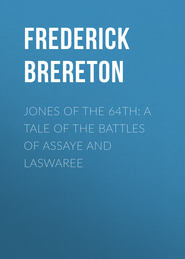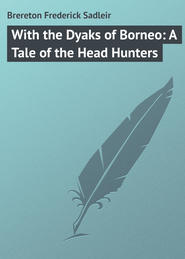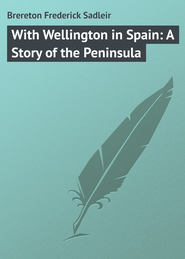По всем вопросам обращайтесь на: info@litportal.ru
(©) 2003-2024.
✖
Roger the Bold: A Tale of the Conquest of Mexico
Настройки чтения
Размер шрифта
Высота строк
Поля
Thanks to the high stern of the enemy, it was easy to pick out the steersman and to observe his movements. By now the Spaniard was about to pass the bows of the brigantine, and as she came to that position, the steersman pushed at the helm, while men were seen running to the braces. Roger took a quick aim and fired.
"Hit!" shouted Sir Thomas. "A brave shot, and see what it brings us."
He pointed excitedly, for the tiller had fallen from the hands of the Spanish steersman, while the unhappy fellow, struck in the breast by Roger's shaft, staggered against the rail of the vessel. The failure to steer at that moment was fatal, for instead of coming up into her new course, the prow of the Spanish ship paid off at once, and she swung across the stem of the brigantine. Instantly the master aboard the latter put his helm over a little, and ere the enemy could recover from their astonishment, or send a relief to the helm, the English ship was forging along on an almost parallel course which, thanks to the fact that the other vessel had almost lost way, brought her quickly into range. Then, indeed, did the men-at-arms and the adventurers give back what they had received. Crossbow bolts and arquebus bullets flew at the Spaniards, while the little cannon shot forth their missiles. Then the prow of the brigantine struck the enemy heavily on the beam, and, sheering off a few feet, came into contact again.
"Aboard her! To the rails!" shouted the English leader.
He seized his cutlass, and sprang on to the rail. A rope gave him an opportunity of clambering up the high sides of the enemy, while Roger's stalwart arm gave him a heave which sent him with a swing on to the higher deck. Then our hero followed, Philip hard on his heels, while the remainder of the ship's company swarmed up wherever and whenever they could, leaving a few to lash the vessels together. A moment later all were engaged in a fierce struggle with the Spaniards, at whose head fought a noble in complete armour.
CHAPTER III
Roger the Lieutenant
The men of England clambered aboard the huge Spaniard like so many monkeys, pikes and swords gripped in their hands. Roger, accompanied by his bosom friend Philip, followed close on the heels of the commander, the former carrying a pike, while Philip bore a short sword.
"Rally! Rally, men of England!" shouted Sir Thomas, as he ran forward to oppose the Spanish leader. "Throw yourselves upon them and sweep them from the decks!"
"We have them in our hands," called out the Spaniard. "We outnumber them by two to one. Now, one rush and they are gone back to their own cockleshell. Together! cut them down!"
There was no doubt that both sides were stubbornly determined to gain the day, the Spaniards perhaps because they hardly knew what it was at those times to meet with defeat, and the English because of their natural determination to win, and perhaps for the reason that defeat meant so much to them. It was therefore with furious courage that they attacked the enemy, their leader crossing swords with Sir Thomas. Roger found himself opposed to a man of medium height, who wielded a sword with wonderful dexterity.
"We have a giant to fight against," cried out this veteran, with a laugh. "Then see how I will cut him down. See me slay the English giant."
"And look to yourself that the giant does not run you through!"
In the excitement of the moment Roger forgot all caution, and wildly lunged at his enemy. But this Spanish man-at-arms was a well-tried warrior, and he stepped aside with an easy movement, and with a disdainful smile on his lips.
"For all your height, but a child, Englishman," he said. "I will kill you before five minutes have passed, and then will your side be without its interpreter."
He set to work at once in earnest, and Roger had as much as he could do to defend himself. Indeed, he was never able to take the offensive, for the merest attempt at a lunge was met so swiftly with such a rapid presentation of the point of the sword wielded by his opponent, that he narrowly escaped. And if he could not touch his enemy, the Spaniard could not do as he had sworn. Twice he had contrived to slightly wound Roger; but our hero merely smiled, for they were but pricks. And now the press of the conflict was separating them. On every side men fought like furies, the clash of weapons being heard amidst the shouts. Here and there a man fell heavily to the deck, or staggered to the rail, there to lean against it while his hands clasped the wound.
But the English were gaining the centre of the deck. At the voice of their leader they advanced together by means of rushes, slashing fiercely, and sweeping the enemy back. And it was in one of these that the Spaniard who had opposed Roger endeavoured to fulfil his promise. He gave way before the onslaught of the enemy, enticing Roger to follow. Then he turned like a tiger at bay, and fell upon the Englishman.
"A promise is a promise," he said. "Now I will kill you as I said."
He very nearly accomplished his purpose too, for his sword descended with tremendous force on Roger's steel cap, severing the handle of the pike on its way. Indeed, had he been a foot shorter the blow would certainly have killed him. But it merely dented the steel cap, and caused him to stagger forward, dropping the end of the pike. It was a fine opportunity, and the Spaniard seized upon it.
"He felt the blow," he shouted. "Now he shall not feel it so much. This to settle the matter between us."
But he had spoken too quickly, for though Roger had staggered forward on to hands and knees, and, in fact, was in a position where his adversary could easily despatch him, yet some fortunate chance caused our hero to act in a manner which saved his life. Had he snatched at the severed pike and tried to rise he would certainly have been cut down. But finding himself sprawling forward at the feet of the enemy, he stretched to his full length on the deck, and with a rapid movement grasped the legs of the Spaniard and lifted them from the boards. Then he flung them upward so quickly that the man crashed back upon the deck, striking it a heavy blow with his head. A second later Roger had taken his sword and had rejoined his comrades.
"A narrow escape," gasped Philip. "You gave the fellow a fine toss, and one which will last him a lifetime. Look at him; he moves, and is crawling away. If looks could annihilate, then our giant would be gone. But what will be the next move? That toss you gave seems to have been the signal for a pause in the fighting."
This was, in fact, what had happened. By mutual and unspoken consent the combatants had drawn away from one another for the moment, and stood glaring across the narrow stretch of deck, while they leaned on their weapons and breathed heavily. But the respite was not to be long enjoyed, and presently, at a shout from Sir Thomas, the men from the brigantine threw themselves once more upon the Spaniards.
"We will drive them to the far end of the deck," he said, "and then do you, Roger de Luce, call upon them to surrender. Now, my men, let us see who likes fighting the best."
There was no lack of enthusiasm amongst the gallant crew which had so recently sailed from England, and though the enemy were stubborn, and fought with a fury and disregard of danger which had already won them fame, they were compelled to retire before the attackers. Struggling for every inch of the deck, they were slowly forced back till the tall poop stood as a barrier behind them. Then it was that Roger's knowledge of the language saved his countrymen.
"Beware, Sir Thomas!" he shouted, working his way to their leader. "I heard the Spanish captain calling upon his men to prepare to spring aside while the guns were fired. They are screened behind the men, and the gunners are ready now with the port fires."
"Then let every man fall flat upon the deck when Roger de Luce gives us the word," shouted Sir Thomas. "Now, on to them again!"
A minute later there was a loud call from the Spanish leader, and at once the enemy broke from the Englishmen, and fled to the rails of the ship, disclosing a couple of big guns in rear which till that moment had been practically hidden. But now they were ready to sweep the English into the sea, and were crammed to the muzzle with all kinds of bullets and scraps of iron and lead.
"Fall flat!" shouted Roger, setting the example by throwing himself prone upon the deck. "Down, every one of you!"
The warning had come none too soon, and undoubtedly, had it not been for his knowledge of the Spanish language, the English crew would have been annihilated. As it was, they were barely upon their faces before two loud explosions shook the galleon, and a mass of iron and lead shrieked over them, and, spreading widely, ploughed a huge hole in the bulwarks. It was a lucky escape, in fact, and Sir Thomas at once prepared to make the most of it. But he was to meet with still more trouble, for the Spaniards were not yet beaten, and still outnumbered his own men. And, worse than that, a shout from one of them, and a turning of the heads of all, called his attention elsewhere. Then he gave vent to a cry of consternation.
"Another ship, and larger than this, I fancy," he called out. "She is bearing down upon us from the island, and will be here in less than an hour. We are lost if we do not retire. Back to the ship, men. Cut the lashings and let us be gone."
"But then we shall be followed by this same ship, sir," shouted Roger. "Cut her masts down before we go. It will take only a few minutes, and the axes are here."
He waited to see whether his commander would approve, and then rushed to the rack which stood at the foot of one of the masts, and which held three big axes, placed there for the very purpose for which they were now to be used.
"Come, Philip," he shouted. "We will have the masts so weak in a minute that they will not carry canvas, while our comrades can hold the enemy. There. Take an axe, and cut to the leeward side."
They fell upon the axes with even greater fury than they had shown some minutes before, and at once attacked the larger of the two masts carried in the waist of the galleon. A third rose from the poop; but this could not be got at, and in any case was unimportant, for it could not carry sufficient canvas to matter. And as they hacked at the wood, Sir Thomas and his men held the enemy in check, beating back their frantic efforts to gain more of the deck and frustrate the efforts of the two who were cutting at the masts. Roger and his comrade took not the slightest notice of them, but instead ran to the second mast as soon as the first had been more than half cut through.
"It will fall the instant the ship is put into the wind," said the former. "If we were to cut deeper it might fall now, and then we ourselves and the men might be hurt, or even the spar might damage or imprison the brigantine. Now let us finish this one."
A minute later they shouted to Sir Thomas, and at the latter's orders the men began to retire slowly, keeping their faces to the enemy all the while. The latter did their utmost to hamper the retirement, and rushed down upon the English furiously. But they could make no impression. The same stubborn, unbroken front was presented, and at the last moment, when many of the men had already regained the brigantine, a final rush and a furious onslaught sent the enemy flying.
"Now over the rail and into our own ship," said Sir Thomas. "But first let us put their cannon out of action. Come, we have men here who have the strength, and those friendly discharges which should have swept us away have done us a service, for they have cleared the rails. Throw yourselves upon the weapons and topple them overboard."
It was an excellent step to take, and Roger and his comrades carried the work out in a manner which did them the utmost credit. A few cuts with sword or axe severed the ropes which held the guns to their rings. Then a dozen pushed at the ponderous weapons, and one by one four of them were thrown into the sea.
"Now retire," said Sir Thomas; "and do you, Roger de Luce, ask the name of the commander here."
Our hero at once stood forward, his axe over his shoulder, and his dented cap tipped to the back of his head. A fine, gallant young fellow he looked, too, with his fair hair and his open features. His head was held erect, and there was a look about him which told of infinite assurance in himself and his comrades.
"From my master, the commander of the brigantine," he called out. "He desires to learn the name of the brave commander of this Spanish galleon."
"Then answer thus." The leader of the Spaniards stepped to the centre of the deck, his helmet discarded, and showing a bearded, strong face. He was covered in every other part by beautifully made armour, and a sword was gripped in one hand. Resting the tip of it on the deck, he leaned upon the hilt and looked towards Sir Thomas. "I am Don Cabeza de Vaca," he said, "and I would ask for the name of my opponent."
"He is Sir Thomas Brice, commander of the brigantine."
"Then tell him that I honour him as a valiant foe, and that I counsel him to depart from these waters. If he escapes the ship which now bears down upon us he will meet with others, for we are on the watch. He will be wise to retire to England, for in these waters he will meet with opposition, and if captured will be executed. This is my friendly warning to a gallant foe."
Roger rapidly translated the words, and waited for his leader's answer.
"Tell the brave Don that I thank him for his advice, but cannot follow it, even if I would. Let him know that nothing shall keep me from sailing on."
A minute later the Spaniard retired to the centre of his men, and Roger clambered over the rail and down to the deck of the brigantine. Already the majority of the lashings had been cast loose, and a few cuts with a knife severed what remained. Then the vessels drifted apart, while the crews watched one another. But there was a strong breeze blowing, and the sails catching this, the brigantine very soon left her opponent in the distance. As for the Spanish vessel, it turned out that things happened as Roger had prophesied; for the minute that she was thrown on to a course to follow the English, the pull of her sails caused the weakened masts to crack, and they came thundering down across her decks. She was left a complete wreck, disarmed and helpless.
"We will crack on every stitch of canvas which we possess," said Sir Thomas, as the brigantine increased her distance from the vessel with which she had just been in action. "What are our chances, master? Will yonder big galleon overhaul us easily?"
"Ay, Sir Thomas. She will sail five feet to our four, and will come up with us. But when, is the question which we have to settle. It is just past noon now, and she is some leagues away. I should say that her guns will speak to us as the dusk falls, and we shall disappear in the darkness as she gets to closer action. Then your honour must decide which course to take. You might attempt to take them by the board, as in this last case."











